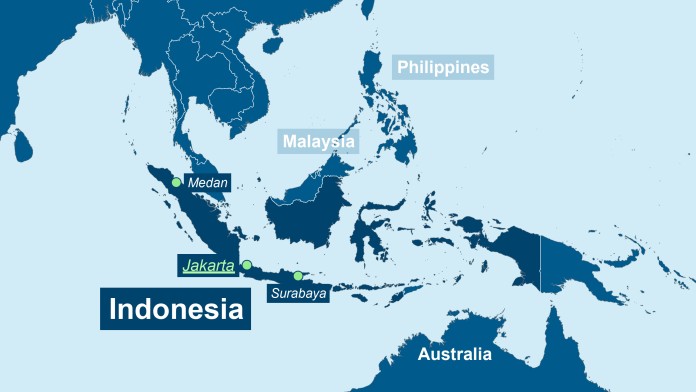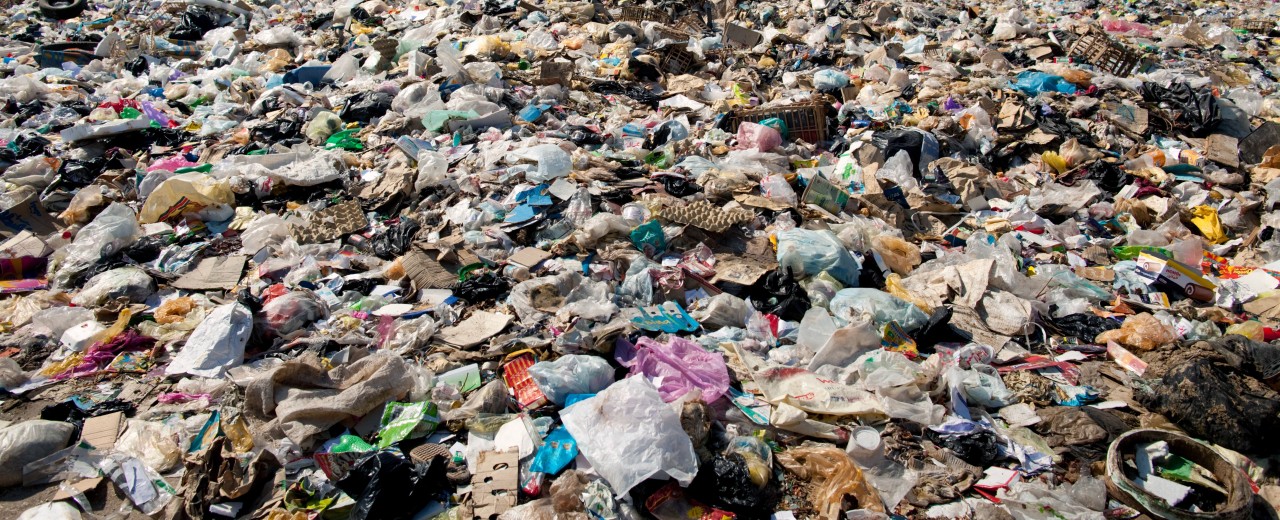
As of: 08/2022
Currently, waste disposal accounts for around 3% of global greenhouse gas emissions. Due to rapid population growth, increasing urbanization and steady growth in consumption solid waste quantities will increase rapidly in the next years. These developments directly result in increased greenhouse gas emissions. Thus, efficient and sustainable concepts of waste management must become an integral part in the global fight against climate change. Indonesia has recognized the importance of this issue and has identified the necessity to improve solid waste management in its national climate change strategy. KfW is supporting Indonesia in its effort to implement investments in an improved infrastructure for solid waste management in selected cities.
Indonesia is undergoing a rapid structural transformation, from a rural to a predominantly urban society. Its urban population of around 137 million people, or 54% of the total population in 2015, will increase to an estimated 68% by 2025 (183 million), making it one of the fastest urbanizing countries in Southeast Asia. The country is one of the largest emitters of greenhouse gases in the world. The Government of Indonesia has therefore committed itself to reduce greenhouse gas emissions by 29%, or even 41% with external support, by 2030.
Almost 13% of Indonesia’s emissions result from improper waste disposal (i.e. burying, burning, controlled disposal). Against that background the Government of Indonesia committed to reduce greenhouse gas emissions from solid waste management as part of its international commitment entered into inter alia in Paris 2015. Additionally, every year, 3.2 million tonnes of plastic waste in Indonesia are still not disposed of correctly and end up in the environment. More than a third of this waste finishes up in the sea. With an annual discharge of around 1.3 million tonnes of plastic waste, Indonesia is the second-largest source of marine litter in the world.
To improve solid waste management and reduce greenhouse gas emission a national strategy has been developed by the Indonesian Government in cooperation with their development partners in order to increase investment in waste management facilities and to improve institutional capacities at the central and local level, as well as social-cultural approaches. Solid waste is disposed of mostly disorderly in Indonesia: In 2014, around 40% of the urban population did not have access to sanitation facilities. Only approximately 80 of the existing 520 landfills are operated in an orderly and sustainable manner. However, Indonesia will remain reliable on landfills for a long time. Therefore, it is vital they are designed and operated in an environmentally, socially, and economically sustainable fashion in order to reduce greenhouse gas emissions along with the pollution of groundwater, rivers, air and soils.

On behalf of the German Government, KfW is supporting the Government of Indonesia to develop more effective solid waste management solutions in four locations: Malang, Jambi, Jombang and Sidoarjo. For this purpose KfW provides a concessional loan amounting to EUR 75 million for funding the program “Emission Reduction in Cities – Solid Waste Management” in which a range of investment activities will be implemented. This includes the construction of new landfills according to modern standards and best practices (and closure and covering of existing dumpsites), the establishment of sorting and composting plants as well as the provision of technical equipment.
The investment activities at the project sited in Indonesia are implemented by the Directorate General of Human Settlements in the Ministry of Public Works and Housing and the local authorities. It is accompanied by human and institutional capacity building activities in order to ensure the long-term operation of new facilities. These activities are funded by a grant provided by the Swiss State Secretariat for Economic Affairs (SECO). Capacity building measures provide support to local Governments to improve their planning and management of solid waste management services, to strengthen organizational structures, establish cost recovery mechanisms and train personnel to effectively and efficiently operate new facilities.
The program “Emission Reduction in Cities – Solid Waste Management” intends to support the Indonesian efforts to reduce greenhouse gas emissions from improper waste disposal. Especially the proper composting of organic waste and landfill gas control will contribute to this goal.
In addition, the program supports the Government of Indonesia´s objective to achieve universal access to sanitation services by 2019. The quality of air and water will be improved, the quality of soils preserved and health risks for the population minimized.
The project is also a part of the Clean Oceans Initiative initiated on behalf of the Federal Government by, KfW, together with the European Investment Bank (EIB) and the French Development Bank (AFD). The Initiative aims at supporting the development and implementation of sustainable projects that will reduce pollution in the world’s oceans over the next five years. The Clean Oceans Initiative also supports plastic prevention measures, market development for recycling plastics and other materials and public awareness building.
The project contributes to the achievement of these following United Nations Sustainable Development Goals:
KfW Group
KfW Development Bank
Urban Development and Mobility East Asia & Pacific
Share page
To share the content of this page with your network, click on one of the icons below.
Note on data protection: When you share content, your personal data is transferred to the selected network.
Data protection
Alternatively, you can also copy the short link: https://www.kfw-entwicklungsbank.de/s/enzBYwX1
Copy link Link copied